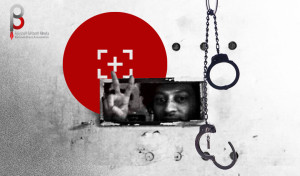Ahmed Humaidan: The longing race between freedom and the distant son
The Alternative Penal Code, implemented in Bahrain since 2018, has allowed thousands of prisoners to return to their families and regain their private lives. Along with this law, the statements of the Crown Prince and Prime Minister Prince Salman bin Hamad Al Khalifa on a proposal about ‘open prisons’ support bets that these two laws would pave the way for the release of more political convicts in the crisis that afflicted Bahrain a decade ago.
Ahmed Humaidan is a 34-year-year-old photographer whose star rose behind bars and outside. He deserves, like everyone else, the opportunity to return to his family. Humaidan does not pose any threat to national security, and he is about to complete his sentence; he spent 8 years of the 10-year sentence that started in 2012. Today, with only 19 months left, he is eligible under the articles of the alternative penal code to embrace freedom.
Prisoners are facing the risk of Coronavirus, and that makes it an urgent necessity for the state to start releasing prisoners who are eligible to benefit from the Alternative Penal Code.
The Bahrain Press Association calls on the government to take into account the previous considerations and to expedite the release of Humaidan. That would be a gesture that will positively impact him and his waiting family, especially his son Reda, who was born during his father’s imprisonment.
The international community considered the arrest of Humaidan, the winner of more than 134 international awards, an arbitrary step that constitutes a violation of freedom of expression in the country.
Humaidan was distinguished by his talent and courage in catching scenes. His award record grew even while in prison. He won two international awards in the fourth International Exhibition of Photography held in Serbia in 2013 for a picture he took of a Bahraini protester amid a cloud of tear gas. He received the gold medal from the Photographic Society of America (PSA) and a bronze medal from the Exhibition’s committee.
In April 2014, Reporters Without Borders chose Humaidan, along with the denaturalized Bahraini blogger Ali Abdel-Imam, among the 100 world information heroes. And in June of the same year, the US National Press Club announced awarding its Freedom of the Media Award to Humaidan as well. In its statement, the Club said, “Independent observers attest to the photographer’s professionalism and that he was targeted because he took the risk of covering events in a bold and unshakeable manner.”
After his arrest, Humaidan was subjected to violations, including alleged psychological and physical torture, ill-treatment, and extracting confessions under duress. Humaidan was left standing blindfolded for two consecutive days in the Criminal Investigations building and was later taken to solitary confinement for 10 days in the Dry Dock (Hidd) Prison after refusing to sign confessions under duress.
Ahmed Humaidan was the eye of the truth; his lens captured the full picture. He loved his work and committed himself to it. He loved his camera that it became his companion. It is the time for Humaidan to return to his life and his family.
